What is schizophrenia?
Schizophrenia is a mental disorder that causes a disconnection from reality. People with schizophrenia suffer distorted thinking (delusions) and perception (hallucinations). These hallucinations are perhaps the most characteristic symptom, but there is more to it than that.
Schizophrenia is more common than you may think. Around 0.5% of the population suffer it, which means that, for every 200 people, 1 suffers it. It happens to both men and women, although it is slightly more common in men and it usually starts in your 20’s or 30’s.
People with schizophrenia get somehow disconnected from reality. This disconnection affects their senses, thinking and beliefs. They can see and hear people that aren’t there, and their interpretation of real events is distorted, too.
For example, they may think they found a hidden message in a newspaper. It is like their own mind is trying to deceive them.
When we talk about schizophrenia we divide its symptoms into positive and negative.
In this context, “positive symptoms” does not mean they are beneficial. Instead, it has a meaning of addition. They experience “extra” things, things they shouldn’t. They see things that aren’t there, voices that don’t exist, and so on.
Negative symptoms, on the other side, have the opposite meaning. In some areas of their psyche, these patients have “less than they should“. Specifically, they have a lack of affection and emotions, as well as little motivation.
From outside, you could expect negative symptoms to be quite tolerable. Nevertheless, it is the other way around. Many people with schizophrenia have a harder time dealing with this lack of motivation and flat-feelings than with their hallucinations.
In fact, some of them don’t mind hallucinations at all, and even become friends with theirs. Also, negative symptoms are the most difficult to treat, as they respond poorly to drugs.
Some examples of positive symptoms…
Auditory hallucinations are the most common symptom of schizophrenia. Also, some patients have visual hallucinations. They see people or hear voices that aren’t real. Sometimes, they hear people talking or children playing in the next room even though they know they are alone at home.
They experience a twisted reality, as if their senses played tricks on them. There are tactile hallucinations as well. I knew a boy who, in his first psychotic crisis, felt his cell phone was heavier when it was fully charged.
People with hallucinations can’t tell reality from their imagination. Their hallucinations look as real as you or me. That’s why it is difficult for them to realize something is wrong, because they don’t have any insight at first.
They have a cognitive blind spot that prevents them from understanding something is not ok. Imagine one day someone tells you that your brother, friend, wife… never existed. Would you believe it?
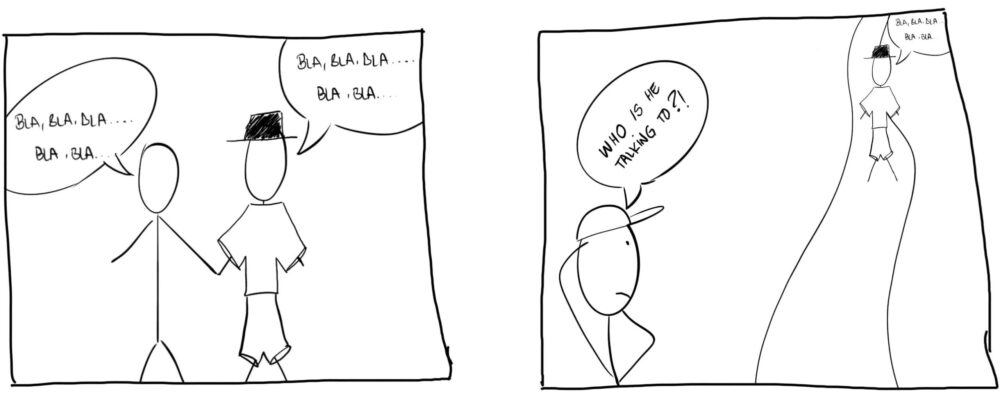
Once they get a diagnosis of schizophrenia, a doctor will explain the situation to them. Some of them will believe him and accept it. Others, on the other side, will believe that doctor is also an actor who is trying to manipulate them.
But even for those who accept their new condition, they don’t have a way to tell hallucinations from reality. Sometimes they try to get a clue from the surrounding people: “Am I the only one seeing that man? Why does nobody else talk to him or look at him? It must be in my mind”.
Delusions are another common symptom. Delusions are distortions of your thinking, false beliefs that don’t match reality. People with delusions start thinking weird stuff.
There are several types of delusions, like reference delusions, where you think everything is happening because of you.
- The light goes off in your building? They probably did that to break into your house.
- The character of a movie makes a threat? That threat is specifically meant for you.
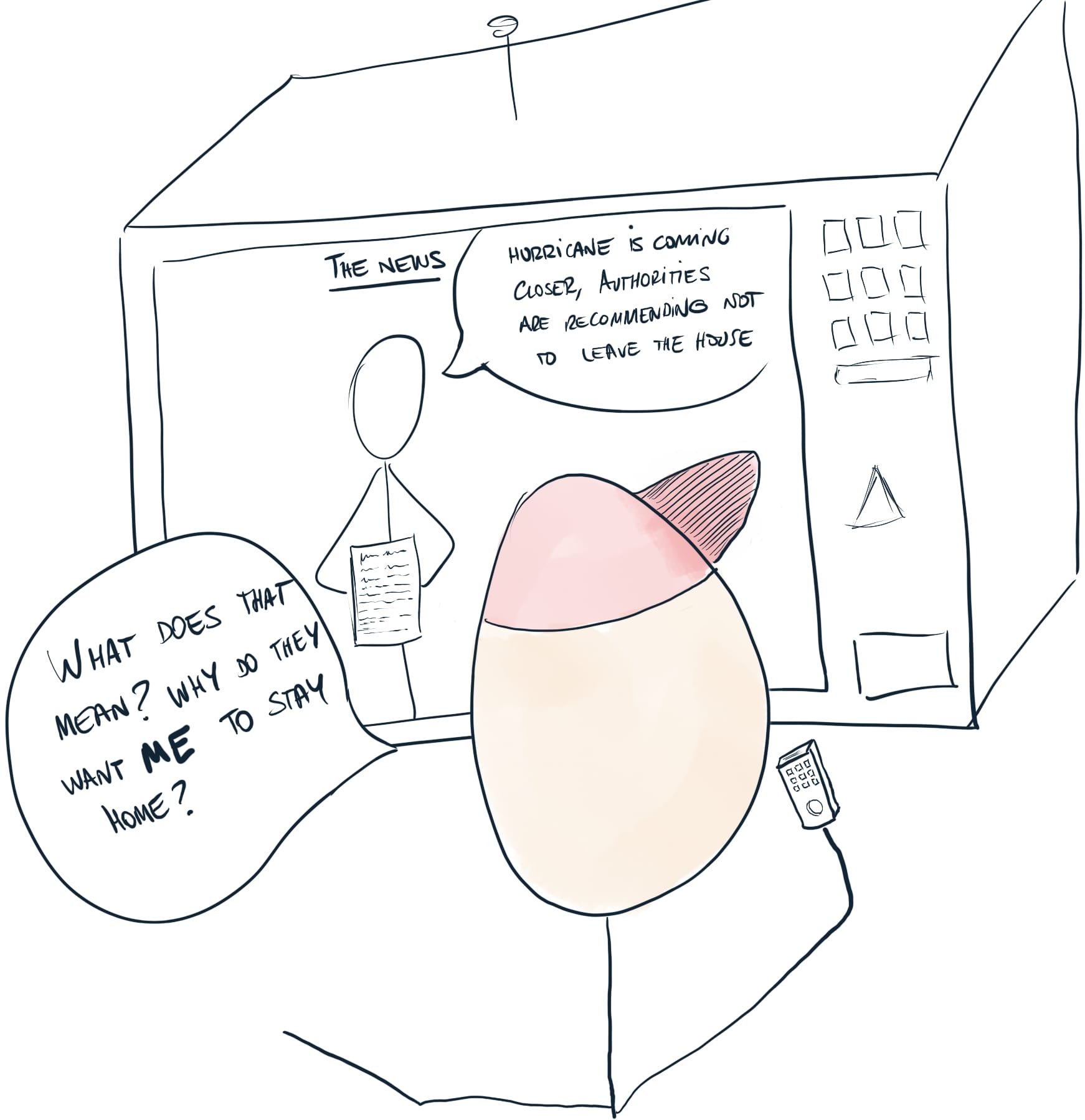
Also, they tend to look for excessive meaning. They try and find meaning behind everything and every coincidence. “Why did the bus driver stare at me for so long? And why did he give me so many coins? Did he put a chip inside one of them?“.
Thought broadcasting is also very typical. They believe people can read their minds and will steal their thoughts. Sometimes, they hear somebody say something and they “know” they have stolen the idea from them, because they think exactly the same.
The opposite can happen, too. They think some people and governments place thoughts inside their head. “The voice inside my head is not mine“. Can you imagine what that feels like?
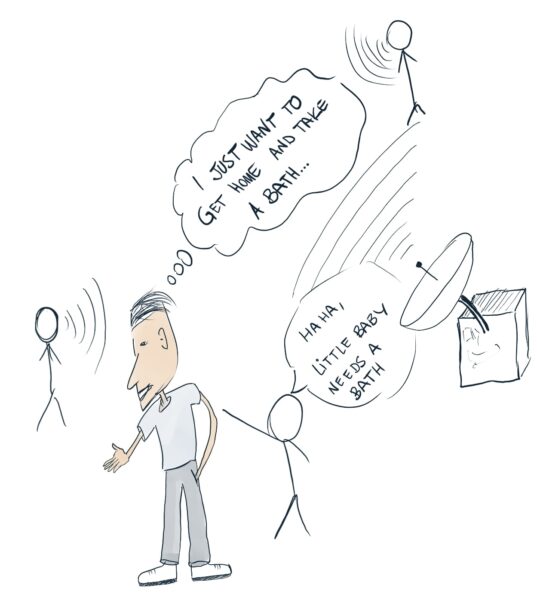
Schizophrenic people also suffer disorganized speech and disorganized behavior. Disorganized speech means they don’t make any sense when they talk. We call it “word salad“, because they use a mix of words, like: dog blue umbrella outside.
The same goes with disorganized behavior, they do things that don’t make much sense, like wearing several sweaters on the hottest day of the summer.
The last positive symptom is catatonia. Fortunately, not all patients suffer it. When a catatonic state happens, patients cannot move at all. They are still, like a statue.
They don’t do it on purpose, they just can’t move. If they are lying on a bed and you take the pillow from them, their head will remain in the same position, a few inches above the bed.
… and some negative symptoms
Negative symptoms are about things they have “too little of”. Basically, they have too little emotions and a flat affection. They have poverty of speech and they lack any motivation and initiative.
Also, they no longer enjoy those things that they liked before. For some patients, these symptoms are the most disabling, more than positive symptoms.
Schizophrenia usually happens in 3 stages
Even though every patient is different, there are usually 3 stages of schizophrenia: prodromal, active and residual.
1 · During the prodromal stage, there aren’t very clear symptoms. Instead, they get more isolated than usual, with no motivation to go out or meet people.
They have trouble sleeping and don’t enjoy things they used to. At this point, it looks more like a depression, or even an anxiety disorder. Only when they enter the next stage we can see there is something else going on.
2 · Then comes the active stage, or the psychotic event. Here, the patient suffers plenty of positive symptoms. They’ll see people, hear voices, become delusional. Most patients are taken to the hospital at this point, because it becomes clear that something is not right.
3 · After that, there is the residual stage. While in hospital, patients receive treatment, which improves positive symptoms. The sights and the voices start to go away.
However, negative symptoms don’t improve that much, and can even sometimes get worse. So, in this stage, there are mainly negative symptoms. The patients feel depressed and, after a while, their emotions become flat.
To make a diagnosis, there must be a combination of several symptoms for at least 6 months, considering the 3 stages:
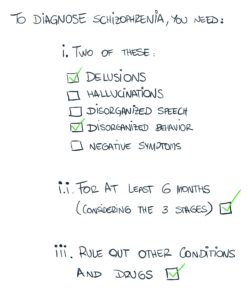
How do you treat schizophrenia?
We don’t know exactly what causes schizophrenia, but we know some of the important factors. For example, we know that schizophrenic patients have too much dopamine in their central nervous system.
Dopamine is a neurotransmitter, which neurons use to communicate between them. Because there is too much of it, the patient gets overstimulated, causing his symptoms. This led to the discovery of antipsychotic drugs, which lower dopamine levels.
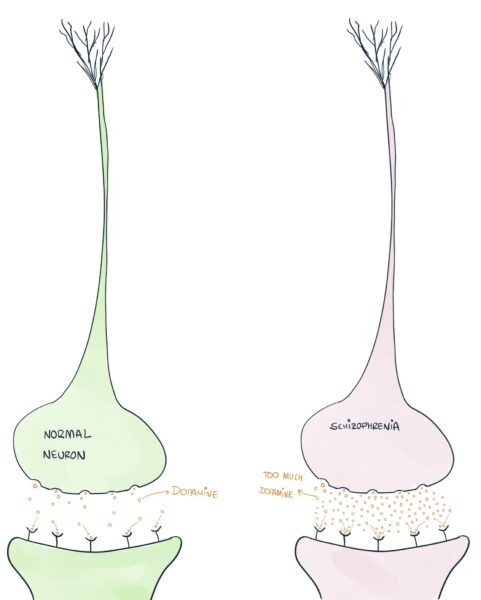
Antipsychotic drugs work best for positive symptoms. They reduce the voices and other hallucinations. However, they can worsen negative symptoms, and some patients can feel more depressed, unmotivated and hollow.
For this reason, many patients have a hard time sticking to their medication. They prefer to hear voices and see imaginary people rather than live in a state of apathy.
A final thought
There is an important stigma around mental health, and even more around schizophrenia. People are usually afraid of schizophrenic people and treat them poorly. Nobody would bully a person with cancer but, for some reason, that doesn’t apply to schizophrenia.
Unlike what most people think, schizophrenic people are not dangerous. If they have no record of violence prior to the disease and if there is no drug abuse history, they are unlikely to commit any crimes.
If they had a previous violent personality… well, then they would probably commit a crime anyway, even without the disease.
Think about this, if you knew 200 people when you were in school, at least one of them could suffer schizophrenia once an adult. It is important for the general population to learn about this disorder and start treating them right.
Most people with the disease would love to be healthy, of course, and they try their best to lead a normal life. Don’t forget that the next time you meet one of them. See you.
Leave a Reply